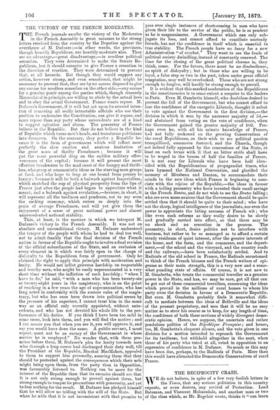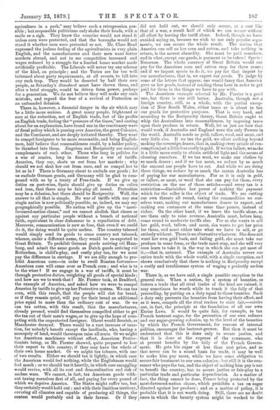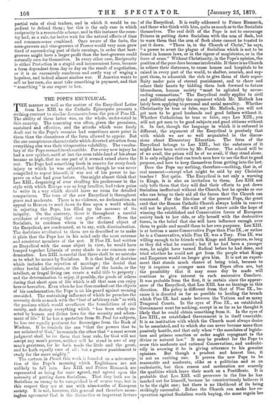THE RECIPROCITY CRAZE.
WE do not believe, in spite of a few very foolish letters in the Times, that any serious politician in this country expects or even desires, any revival of Protection. Lord Bateman, and Viscount Holmesdale, and another man or two of the class which, as Mr. Bagehot wrote, thinks it "can learn agriculture in a park," may believe such a retrogression pos- sible; but responsible politicians only shake their heads, with a smile or a sigh. They know the counties would not stand it unless corn were protected, and that the boroughs would not stand it whether corn were protected or not. Mr. Clare Read expressed the jealous feeling of the agriculturists in very plain English, and the manufacturers and their men want better markets abroad, and not to see competition increased and wages reduced by a struggle for a limited home market made artificially profitable. The Liberals will never try any scheme of the kind, on principle ; and the Tories are far too well informed about party requirements, at all events, to fall into any such trap. They would be deserted by half their own people, as Saturday's 'Standard must have shown them, and after a brief struggle would be driven from power, perhaps for a generation. We do not believe they will make any such mistake, and regard the fear of a revival of Protection as an unfounded delusion.
There is, however, a financial danger in the air which may be a little more serious. A great many people, frightened or sore at the reduction, not of English trade, but of the profits on English trade, feeling the "pressure of the times," and casting about for an explanation, have found one in the reactionary wave of fiscal policy which is passing over America, the great Colonies, and the Continent, and are deeply irritated thereby. They want to compel foreigners to be more reasonable, and being English- men, half believe that reasonableness could, by a bolder policy, be thrashed into them. Jingoism and Reciprocity are natural complements of each other. Those who long in politics for a war of armies, long in finance for a war of tariffs. America, they say, shuts us out from her markets ; why should we not shut her out from ours, and so compel her to let us in ? There is Germany about to exclude our goods ; let us exclude German goods, and Germany will be glad to com- pound with us by a treaty of Free-trade. If we give up duties on port-wine, Spain should give up duties on calico and iron, that there may be fair-play all round. Protection may be a delusion, but there should be Reciprocity. Well, the answer to all that is simple. No war of tariffs with any one single nation is now politically possible, or, indeed, we may say geographically possible. No nation will give up the "most- favoured-nation clause," and we cannot abolish that clause as against any particular people without a breach of national faith, equivalent in clear dishonour to a repudiation of debt. Moreover, communication is now so free, that even if we could do it, the doing would be quite useless. The country tabooed would simply send its goods to some country not tabooed, whence, under a different name, they would be re-exported to Great Britain. To prohibit German goods arriving via Ham- burg, and admit the same goods as Dutch goods arriving vici Rotterdam, is child's-play, and costly play too, for we must pay the difference in carriage. If we are silly enough to pro- hibit American corn—in order to swell Russian fortunes—. American corn will come over as French corn ; and who is to be the wiser ? If we engage in a war of tariffs, it must be through protective duties, weighting all goods of special kinds ; and how are we to work that ? Mr. Forster took, at Bradford, the example of .America, and asked how we were to compel America by tariffs to give up her Protective system. We can tax corn, with this result, that the people will riot for bread, or if they remain quiet, will pay for their bread an additional price equal to more than the ordinary cost of war. Or we can tax cotton, with this result, that the manufacturers, already pressed, would find themselves compelled either to get the tax out of their men's wages, or to give up the hope of com- peting with the unprotected foreigner. Ghent would flourish, as Manchester decayed. There would be a vast increase of taxa- tion, for nobody's benefit except the landlords, who, having a monopoly of land, would thereupon raise all rents. Or we might tax American machinery without effect, American Protec- tionists being, as Mr. Forster showed, quite prepared to lose their export to this country, if they may have the whole of their own home market. Or we might tax tobacco, with one of two results. Either we should tax it lightly, in which case the American would feel nothing, while the Englishman would feel much ; or we should tax it heavily, in which case smuggling would revive, with all its cost and demoralisation and risk of useless wars. We cannot, in fact, tax American goods with- out taxing ourselves first of all, and paying for every pound of which we deprive America. The States might suffer too, but they certainly would hold out ; and with their limitless territory, covering all climates and capable of producing all things, the contest would probably end in their favour. Or if they
did not hold out, we should only secure, at a cost like that of a war, a result half of which we can secure without all effort by leaving the tariff alone. Indeed, though we have avoided saying 80, because we wish to use only popular argu- ments, we can secure the whole result. The notion that America can sell us her corn and cotton, and take nothing in return, is the merest absurdity. She must be paid somehow, and in what, except our goods, is payment to be taken? Specie ? Nonsense. The whole currency of Great Britain would not pay for the American corn and cotton crop for three years ; and if we import specie to do it, we pay for that import by our manufactures, that is, we export our goods. To judge by some of the letters that appear, one would fancy that America gave us her goods, instead of sending them here in order to get paid for them in the things we have to pay with.
The American example selected by Mr. Forster is a good one, but there is one still better. Australia, though not a foreign country, still, as a whole, with the partial excep- tion of New South Wales, either taxes or is about to tax our goods for protective purposes. That is very hard, and according to the Reciprocity theory, Great Britain ought to whip the Australians into reasonableness, by imposing taxes upon their produce in return. Well, let us just see how that would work, if Australia and England were the only Powers in the world. Australia sends us gold, tallow, wool, and meat, and very little else. If we tax the gold, we effect nothing beyond making the sovereign dearer, that is, making every article of con- sumption just a little less costly in gold. If we tax tallow, we make it a little more costly to obtain artificial light and the means of cleaning ourselves. If we tax wool, we make our clothes by so much dearer ; and if we tax meat, we reduce by so much the amount our people have to eat. And while we are doing these things, we reduce by so much the means Australia has of paying for our manufactures. For as it is only in gold, or tallow, or meat, or wool that she can pay for them, every restriction on the use of those articles—and every tax is a restriction—diminishes her power of making the payment which for the seller is the object of trade. We are cutting our own throats all round, taxing the commodities we our- selves want, making our manufactures dearer to export, and making our customers at the same time poorer, instead of richer. On the other hand, if we leave the tariffs alone, or use them only to raise revenue, Australia must, before long, come round to moderate tariffs also. For as she wants to sell her gold, wool, tallow, and meat, she wants to get her price for them, and must either take what we have to sell, or go entirely without. There is no alternative whatever. She does not want her own gold back, and failing gold, she must take our produce in some form, or the trade must stop, and she will very soon learn to take it in the way in which she can get most of it,—that is, untaxed. The example of Australia covers our entire trade with the whole world, with a single exception, and shows conclusively that there is nothing in Reciprocity except a costly and troublesome system of waging a perfectly useless war.
There is, as we have said, a single possible exception to the general rule. When a nation, by a system of bounties, so fosters a trade that all rival trades of the kind are ruined, it may sometimes be worth while to teach it the folly of that proceeding, by putting on a duty equal to those bounties. Such a duty only prevents the bounties from having their effect, and as it were, compels all the rival traders to start fair,--carries out, in fact, the principle at the foundation of all our own Excise Laws. It would be quite fair, for example, to tax French beetroot sugar, for the protection of our own refiners and our sugar-growing colonies, up to the level of the bounties by which the French Government, for reasons of internal politics, encourages the beetroot-grower. But then it must be understood that this is done only to secure justice, and that it is done at the expense of the consumer, who at present benefits by the folly of the French Govern- ment. He gets his sugar at less than cost price, and as that never can be a sound basis for trade, it may be well to make him pay more, while we have some obligation to secure fair treatment to our own colonies ; but still it is the con- sumer who pays the tax, and the object of making him pay is not to benefit the country, but to secure justice or fair-play to a particular trade and particular dependencies. As a matter of fact, the thing cannot be done, France being protected by the most-favoured-nation clause, which prohibits a tax on sugar directed against her produce ; and as a matter of policy, it is probable that it is not worth doing. Still, there are no doubt cases in which the bounty system might be worked to the partial ruin of rival traders, and in which it would be ex- pedient to defend them ; but this is the only case in which reciprocity is a reasonable scheme, and in this instance the coun- try had, as a rule, far better wait for the natural effects of time and common-sense combined. Once aware of the facts, the corn-growers and vine-growers of France would very soon grow tired of surrendering part of their earnings, in order that beet- growers might have a larger profit than the beet-growers could naturally earn for themselves. In every other case, Reciprocity is either Protection in a stupid and inconvenient form, because a form dependent from day to day on the result of negotiation, or it is an excessively cumbrous and costly way of waging a hopeless, and indeed almost aimless war. If America wants to sell us her corn, she must take something in payment, and that " something " is our export to her.




































 Previous page
Previous page